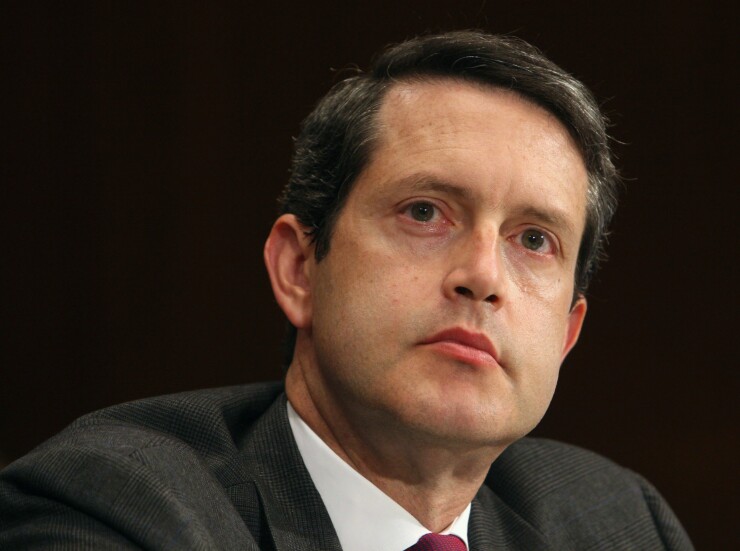WASHINGTON — Randal Quarles, the latest front-runner for the vice chair of banking supervision at the Federal Reserve Board, would represent a moderate, mainstream Republican choice that is likely to be welcomed by the financial services industry.
Quarles is the third prominent ex-regulator to be floated as the likely pick, following David Nason, who also served in the Bush-era Treasury Department and later withdrew his name from consideration, and Thomas Vartanian, formerly with the Office of the Comptroller of the Currency.
All three appear to reflect the influence of Gary Cohn, the director of the National Economic Council, who is seen as a moderating voice against President Trump’s more populist advisers. Quarles, like the other two, has a long track record on financial services industry, and is widely seen as a solid, no-nonsense pick.

“He is exactly the kind of guy you would want to be chosen for these positions. He totally understands the negative effects of Dodd-Frank, but he also understands some of the important things that it was trying to address,” said Howard Headlee, the head of the Utah Bankers Association.
Quarles would be “able to sort through the substance and disregard the politics” that are often associated with Dodd-Frank, Headlee said.
Quarles served as Treasury undersecretary for domestic finance from 2005 to 2006 and was assistant secretary for international affairs before that. After leaving Treasury, he became managing director of the Cynosure Group, a private equity firm in Salt Lake City.
Since the financial crisis, Quarles has argued that regulation should be based more on a firm’s activities than its size, a view that would put him in line with much of the existing Fed leadership.
During his tenure at Treasury, Quarles was a proponent of housing finance reform, including criticizing Fannie Mae and Freddie Mac’s retained portfolios, which he worried concentrated more interest rate risk in the government-sponsored enterprises. He also said the implicit government guarantee allowed them to grow without market discipline and become systemically risky.
Unlike some other rumored nominees for the Fed spot, such as Federal Deposit Insurance Corp. Vice Chairman Thomas Hoenig, Quarles is not seen as seeking wholesale changes to the banking system. In an interview in 2015, he stopped short of calling for a repeal of Dodd-Frank, something the president endorsed as recently as last week.
“There are ways to refine Dodd-Frank and other forms of regulatory policy in ways that would be beneficial to the economy,” Quarles told Bloomberg News. “In some ways, Dodd-Frank was not ambitious enough, and in other ways it was overly ambitious.”
Though any Trump administration nominee can expect a tough grilling by the Senate Banking Committee, Quarles’ relatively moderate views are unlikely to prompt a serious effort by Democrats to stop his nomination if made.
“It’s early, but we don’t see anything in his past that would make his confirmation by the Senate unusually difficult,” Ian Katz, a policy analyst at Capital Alpha Partners, said in a note to clients.
Even consumer advocates said they see enough in Quarles’ past to suggest he could be an ally in some fights.
“As a veteran financial firefighter, ideally, Quarles will bring an understanding of sensible safeguards,” said Bartlett Naylor, a financial policy advocate at the government watchdog group Public Citizen. “He should welcome the opportunity to cap his career by solidifying Fed supervision that liberates America from [too big to fail] megabanks.”
However, some may also criticize his tenure at the Bush Treasury, which failed to thwart the financial crisis.
“I don’t see how going back to the G.W. Bush Treasury Department is exactly what we want to see,” said Marcus Stanley, policy director at Americans for Financial Reform, a nonprofit coalition of consumer and civil rights groups.
Quarles has also been a longtime proponent of regulatory relief.
“I think that the issue of regulatory burden is one that the department as a policy matter needs to be very sensitive to,” Quarles said during his confirmation hearing in 2005. “I think that regulatory compliance costs are something that need to be an integral part of the thinking in determining an appropriate regulatory framework.”
While his support for less regulation would likely be welcomed by Republicans, some of his views could pit him against House Financial Services Committee Chairman Rep. Jeb Hensarling, R-Tex., who has advocated higher capital requirements.
In a Wall Street Journal op-ed last year co-written with Lawrence Goodman, president of the Center for Financial Stability, Quarles warned that “the consequence of a dramatic increase in bank capital is an increase in the cost of bank credit, meaning higher interest rates across the board.”





